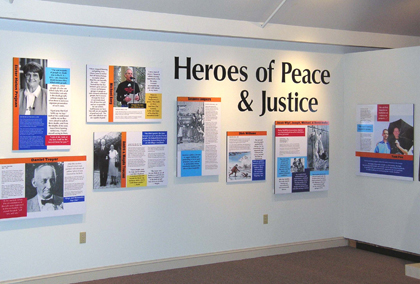Mary Jane Lederach Hershey, Salford
mjhershey@aol.com
For the past three summers, Salford Mennonite Church has hosted a group of educators from South Africa. These teachers come to the University of Pennsylvania to study for a five-week term. In 2006, 24 South African scholars came to Salford homes for a weekend in July. My husband Hiram and I hosted Kholeka Kholly, a language teacher who taught English and two provincial languages, Afrikaans and isiXhosa, in Queenstown.
On Saturday afternoon as I was becoming acquainted with Kholly, I asked about her parents and family. She said she never knew her father, because he died when she was born. Her mother was murdered about seven years ago, by thieves who broke into her mother’s home, robbed and killed her. Kholly expressed her regret that the hanging of criminals is no longer legal in South Africa, adding that she hated the murderers of her mother and would hang them herself, if she could. During this conversation I talked to Kholly about capital punishment in this country, about the work of Sister Helen Prejean who accompanies men on death row to their execution. I also talked about the victim–reconciliation program.
During 2006 the Mennonite Heritage Center mounted an exhibit entitled “Blessed are the Peacemakers.” The exhibit included a wall of 15 panels called “Heroes of Peace and Justice” with pictures, information, and writings by worldwide justice and peace leaders. The peacemakers portrayed ranged from Anabaptist martyrs, to Mahatma Gandhi, to local peacemakers like Lois Gunden Clemens and Clayton Kratz.
Whenever we have international guests, we plan ahead what we will do in the evening. Although the Mennonite Heritage Center in Harleysville is rarely open on Saturday evening, I knew that on this particular Saturday, the Center would be open for a special film night. I planned to take our guest Kholly to the Center after dinner and a visit with our son and family.
That evening at the Center we viewed the “Heroes of Peace and Justice” exhibit. First, we talked about the Anabaptist martyrs and how they forgave their assassins before they died. She read the panels of the peacemakers she knew; Martin Luther King, Jr., Nelson Mandela, and Gandhi. I told her about Pastor Andre and Magda Trocomè, whose French town of Le Chambon hid thousands of Jews after Pastor Andre asked his congregation to shelter “the people of the Bible.” We read the story of how Michael Berg had forgiven the men in Iraq who beheaded his son Nick. Kholly read the Tom Fox panel and the prophetic words of Fox, “We forgive those who consider us their enemy.” After she finished reading, she stood in silence for a few minutes, and then turned to me and said, “They all say the same thing – it’s forgiveness.”
When Kholly came to breakfast Sunday morning, her first words were “I am a changed woman. They won’t know me when I return home. I have forgiven those who killed my mother.”
I told her I was thankful that her heart had changed. However, I did not really believe, because I thought, “How could anyone, overnight, forgive such a heinous crime?”
Later that morning, during the discussion hour at Salford, she shared this change again. And later in the afternoon, she told various people who had gathered at our house, “I am a different person. I have forgiven.”
 As we left our house to meet the bus to return to Philadelphia, she asked if she could again visit the exhibit. She wanted to photograph the panels. We hurriedly did so, and had her at the bus only a few minutes late.
As we left our house to meet the bus to return to Philadelphia, she asked if she could again visit the exhibit. She wanted to photograph the panels. We hurriedly did so, and had her at the bus only a few minutes late.
Her final words came via e-mail:
Thank you both for a very enjoyable weekend. All of your guests are singing your praises as well. After the readings, I can safely say I’m a new peaceful person. God moves in a mysterious way. God bless.
God does move mysteriously. These panels are now on exhibit in the lobby of the Salford Mennonite Church.
Mary Jane Lederach Hershey is currently Trustee Emeritus for MHEP.
The opinions expressed in articles posted on Mosaic’s website are those of the author and may not reflect the official policy of Mosaic Conference. Mosaic is a large conference, crossing ethnicities, geographies, generations, theologies, and politics. Each person can only speak for themselves; no one can represent “the conference.” May God give us the grace to hear what the Spirit is speaking to us through people with whom we disagree and the humility and courage to love one another even when those disagreements can’t be bridged.
